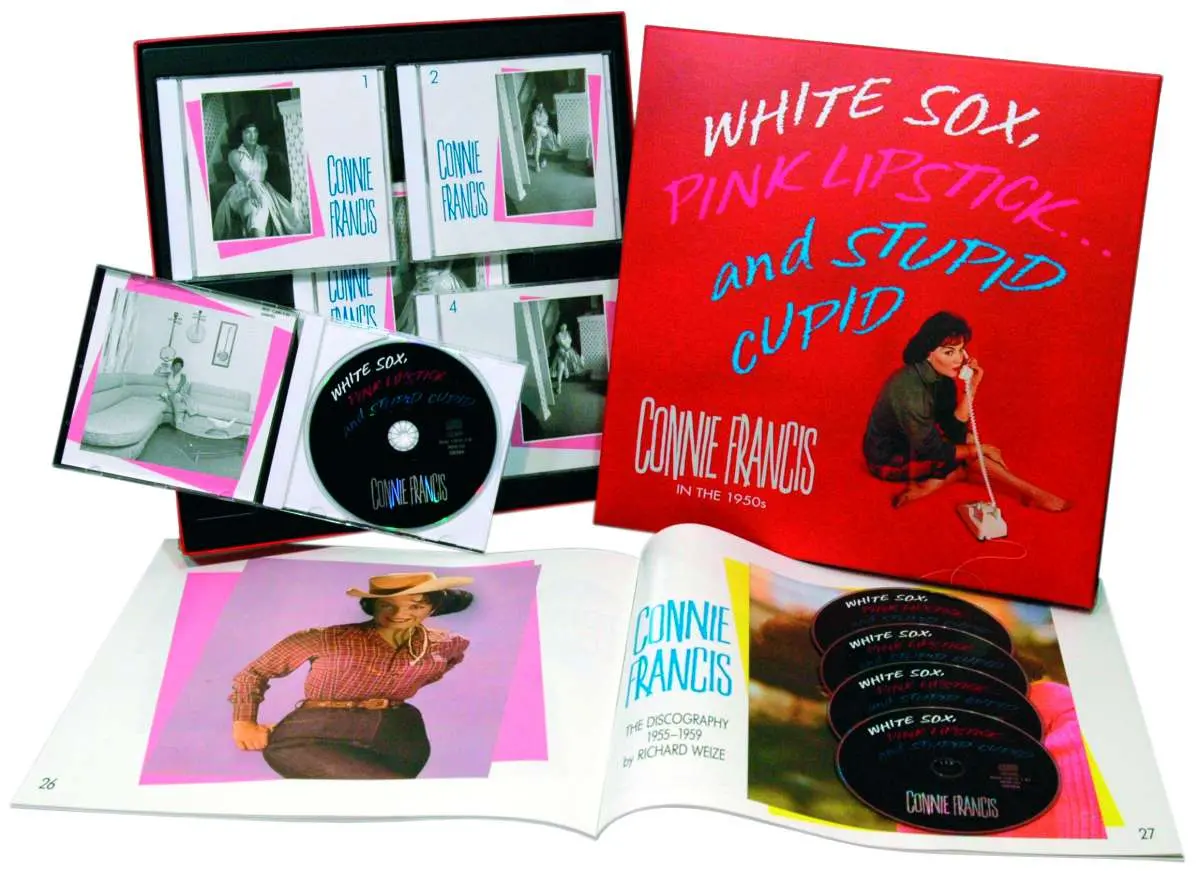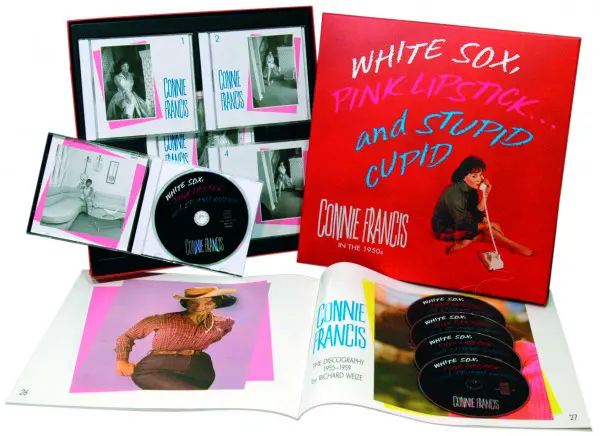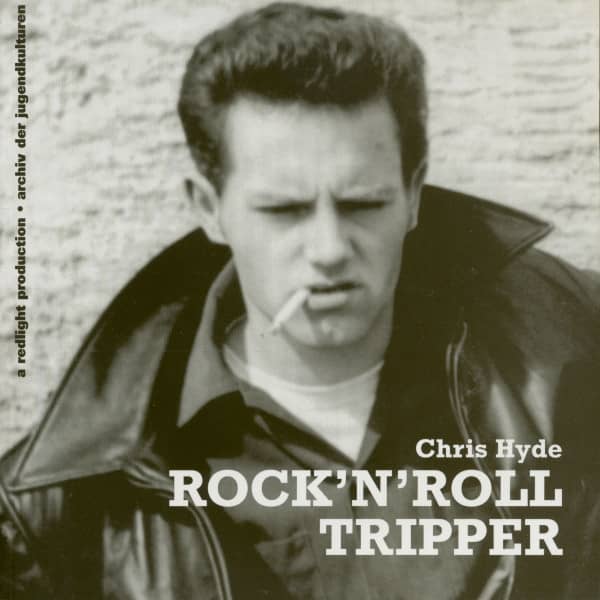Connie Francis Follow The Boys - 1963 (DVD)
* incl. VAT / plus shipping costsDepending on the country of delivery, the VAT at checkout may vary.
Item is temporarily out of stock.
Approx. delivery time: up to 3 weeks. (as far as available at the supplier - can be faster, but sometimes unfortunately not)
- catalog number:DVDWB35363
- weight in Kg 0.11
Connie Francis: Follow The Boys - 1963 (DVD)
Article properties:Connie Francis: Follow The Boys - 1963 (DVD)
Interpret: Connie Francis
Album titlle: Follow The Boys - 1963 (DVD)
Label WARNER
Genre Rock'n'Roll
Artikelart DVD
EAN: 0883316353639
- weight in Kg 0.11
Connie Francis
 Born on 12 December 1937 as Concetta Rosa Maria Franconero in Newark, New Jersey.
Born on 12 December 1937 as Concetta Rosa Maria Franconero in Newark, New Jersey.
Connie Francis the female pop icon
Connie Francies was discovered at the age of eleven during a talent show, six years later she received a contract from MGM. Their first single ('Freddy') was released in 1955, which, like some others, initially went unnoticed.
It wasn't until 1958 that 'Who's Sorry Now' (built in 1923) became her first chart hit in the USA, followed by 54 more until 1969. In England the most successful singer of the 50s and 60s brought 24 tracks to the hit lists (1958 - 66), of her 35 German-language original singles, 23 placed between 1960 and 1970.
No other interpreter in the world used the time span after the heyday of rock'n'roll and the beginning of the beat era so cleverly. When Connie Francis' golden years were over, she stood up for UNICEF and went to Vietnam as a singing troop adviser.
Since 1960 she has also appeared in various US films, such as "Where The Boys Are' ('These Include Two', 1960), "Follow The Boys' ('Mein Schiff fährt zu dir', 1962), "Looking For Love' ('Ich wär' so gern verliebt', 1963) and 'When Boy Meets Girl' ('Boy of My Dreams', 1965).
In 1974, after a performance at the Westbury Theatre outside New York, she was attacked and raped - a crime from which she did not recover psychologically for many years. She made guest appearances again in the early 80s, but towards the end of the decade her unstable health again took its toll. After language problems during a show in London's Palladium, there were similar signs during a TV conversation on American television.
In 1991 Connie Francis collapsed during a concert in New Jersey. In 1992, several Francis titles in Germany experienced a renaissance: The Medleys "Jive Connie' and '(10, Connie, Go' shot to the top of the hit lists.
In 1993 she recorded the duets'Que Sera' and'So nah' in Munich with Peter Kraus for Sony's Herzklang label - in England a song from a TV series became a surprise hit:'Lipstick On Your Collar' from 1959.
From the Bear Family book - 1000 pinpricks by Bernd Matheja - BFB10025 -
Connie Francis
Connie Rocks
 The rock 'n' roll era was a boys club. Most of the top-selling artists were male: just a few female artists could go head-to-head with them. Of the women from that era, Connie Francis was by far the top-seller. Rock 'n' roll was testosterone-rich music, and Connie realized early in her career that she couldn't cut loose with a banshee rockabilly wail, but she could make very believable rock 'n' roll music that was true to her background and her unique talent.
The rock 'n' roll era was a boys club. Most of the top-selling artists were male: just a few female artists could go head-to-head with them. Of the women from that era, Connie Francis was by far the top-seller. Rock 'n' roll was testosterone-rich music, and Connie realized early in her career that she couldn't cut loose with a banshee rockabilly wail, but she could make very believable rock 'n' roll music that was true to her background and her unique talent.
Connie was born Concetta Maria Franconero on December 12, 1938 in Newark, New Jersey. Her parents had been born in the United States to Italian immigrant families. Connie's paternal grandfather arrived in 1905, carrying a battered concertina and little else. Connie sat on the stoop of their house, learning the folk songs from the old country. It soon became clear that she had talent, and began appearing at entry-level talent contests in and around New Jersey, singing and playing the accordion. Connie's father, George Franconero, took an interest in her budding career and took her to New York, trying to get her on a childrens' television show, 'Startime.' "We flagged down the producer of the show, George Scheck, who was hailing a taxi," Connie said later. "My father said, 'Would you listen to my daughter sing?' He said, 'I'm up to here in singers. I can't use singers.' That's when "the accordion saved my life." Scheck said that he would give her an audition if she played the accordion, and she was on 'Startime' for four years. Eventually, Scheck became her manager.
In 1950, Connie appeared coast-to-coast on 'Arthur Godfrey's Talent Scouts,' and was often on television over the next few years. It was Godfrey, incidentally, who suggested that she change her name to Connie Francis. By age fourteen, Connie was crossing the river to New York, singing demonstration discs for music publishers. In 1955, Lou Levy at Leeds Music financed a session with George Scheck, and they jointly took the masters around to the record labels. The only taker was MGM Records' A&R man, Harry Meyerson. One of the songs on the demo tape was one titled Freddy, and Connie was later told that Meyerson only signed her because his son's name was Freddy and he thought the record would make a good birthday present.
The early singles did little business, and Connie was handed to Jim Vienneau, who was related to MGM Records' founding president, Frank Walker. Vienneau was given the responsibility of bringing MGM into the rock 'n' roll era, and he found a song for Connie called Eighteen. It signalled a new direction and the initial response was promising, but it too failed to chart. After nine consecutive flops, Connie was told that she would get one last shot on MGM before being dropped. Two people guided Connie's career, George Scheck and her father, George Franconero. At her father's insistence, Connie recorded an old jazz age pop tune, Who's Sorry Now, with a double-tracked vocal similar to Patti Page. "My father," said Connie, "had an ear for what people would like from me that was uncanny. On that last session, he said, 'Here's a song I've been trying to shove down your throat for the last year-and-a-half.' I said, 'Don't tell me it's that 1923 song again. Did people actually write their names in 1923? I'm not doing it.' He said, 'Go ahead, have another bomb, and you end your career. I'm surprised they stuck with you this long. Tell you what. Do me a big favor. Pretend I'm gonna die tomorrow and this is my last wish. You pick out your usual three duds and throw this one in for me.'"
George Franconero was right, of course. Released in November 1957, Who's Sorry Now? got a little airplay around the country, but didn't take off until MGM's Philadelphia distributor, Ed Barsky, took a copy to Dick Clark. "Dick heard a sound in me that was totally different," Connie said later. "The reaction was just phenomenal. He played it every day for three months." Connie freely admits that she owes her success to Dick Clark and the repeated plays on 'American Bandstand.' If not for him, she would have been dropped when her contract was up. Who's Sorry Now? reached #3 in 'Cash Box,' #4 in 'Billboard,' and #1 in England.
Another revamped oldie was released as a follow-up, but did nowhere near as well. It was then that music publisher Donnie Kirshner suggested that she listen to two young songwriters he'd just signed, Neil Sedaka and Howie Greenfield. After Sedaka and Greenfield had played all their ballads, Connie said she wanted to hear something peppier. Neil decided to play Stupid Cupid (which, according to Howard Greenfield, was written for Sal Mineo, then promised to the Shepherd Sisters). Connie loved it, and Neil came along to Connie's June 18, 1958 session to play piano. Within a month Stupid Cupid was in the Top 20. The B-side was an older song that dated back to 1929, Carolina Moon. The combination became a double-sided smash, so it was hardly surprising that Connie turned to Sedaka and Greenfield for her next single, Fallin', but it stalled just outside the Top 30, prompting a return to the oldies. My Happiness, a Depression era song that had been a big hit in 1948, capped an incredible year when it became Connie's biggest hit to that point. 1958 was the year Connie Francis arrived, and she wouldn't be out of the charts for another ten years.
1959 opened with Connie considering songs for her next single. She liked one that veteran music publisher, Leonard Joy, sent over, Lipstick On Your Collar. Now she needed a B-side. "Howie Greenfield was my favorite lyricist," she told William Ruhlmann. "Any time a session came up I would sit in my office for days, morning 'til night, and listen to every publisher, every songwriter, but Neil and Howie never failed to come up with a hit for me. It was a great marriage. We thought the same way. Neil and Howie and I planned the song 'Frankie.' Neil would say, 'Okay, what you got on your mind, Concetta?' I said, 'Look at this. I made a list. All of these songs in the last three years, one third of them are names of people or places. One side of my new single, "Lipstick," will be uptempo so I'd like a real dreamy, slow dance ballad for the other side.' Neil said, 'Okay.' Within the next day, 'Frankie' was there." Who was Frankie? The story was put around that the song was a valentine to Frankie Avalon, who'd starred in 'Jamboree,' the movie for which Connie provided the ghosted singing voice of the female lead. Not everyone liked it, though. On April 15, 1959, Connie recorded it with arranger Ray Ellis. "The music starts, and just impromptu, I say, 'Frankie, wherever you are, I love you.' Ray Ellis said, 'This is too much for me. I can't handle this. This is such shit.' I said, 'It's on the record. The kids like that stuff. Just relax, I'm doing it.' He said, 'You ain't gonna have a hit.' I said, 'Let my mother worry about that.'" But a hit it was: a double-sided Top 10 smash. The same session also produced the follow-up, Eddie Curtis' You're Gonna Miss Me (Curtis would later write songs for Connie's 'Do The Twist' LP). The flip-side of You're Gonna Miss Me was Plenty Good Lovin', the first time Connie had placed one of her own songs on a single.
Just in time for Christmas 1959, MGM took the unprecedented step of releasing five Connie Francis albums at once. There was a Christmas album, a country album, an Italian album, a greatest hits album, and a collection of rock 'n' roll million-sellers. Truly something for everyone. From the rock 'n' roll album, we've taken Tweedle Dee, I Hear You Knockin', and the breakthrough hit for MGM labelmate Conway Twitty, It's Only Make Believe. And 1959, like 1958, closed with another Connie Francis song ascending the charts, this time a revival of a 1927 British song, Among My Souvenirs, which she'd found in a publication called 'The Musicians Handbook.' It reached #7 as the year closed. On December 12, 1959, Connie Francis turned twenty-one years old, and shortly before Christmas she reached one of the pinnacles of success in the popular music business when she sold out Carnegie Hall. In contractual discussions with MGM, she'd achieved an unprecedented level of artistic control over her recordings. She was twenty-one and she was in control of her life and career. The following April she received an award for Best Selling Female Vocalist from a record industry trade group, NARM (National Association of Record Merchandisers).

Ready to ship today, delivery time** appr. 1-3 workdays

Ready to ship today, delivery time** appr. 1-3 workdays

Ready to ship today, delivery time** appr. 1-3 workdays

Ready to ship today, delivery time** appr. 1-3 workdays

Ready to ship today, delivery time** appr. 1-3 workdays

Ready to ship today, delivery time** appr. 1-3 workdays

the very last 1 available
Ready to ship today, delivery time** appr. 1-3 workdays

Ready to ship today, delivery time** appr. 1-3 workdays

only 2x still available
Ready to ship today, delivery time** appr. 1-3 workdays

Ready to ship today, delivery time** appr. 1-3 workdays

This article is deleted and can no longer be ordered!

Ready to ship today, delivery time** appr. 1-3 workdays

Ready to ship today, delivery time** appr. 1-3 workdays

the very last 1 available
Ready to ship today, delivery time** appr. 1-3 workdays





